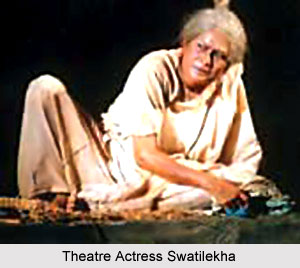 Nandikar is a theatre group in India, with its headquarters in Kolkata, West Bengal, but is famous for its works presented all across the world. This theatre group was formed in June 29, 1960 when Ajitesh Bandopadhyay and Asit Bandopadhyay along with a group of dedicated young theatre persons created Nandikar - their own group. This group of eminent theatre persons included Ajoy Ganguly, Dipen Sengupta, Satyan Mitra, later joined by Keya Chakravorty, Bibhash Chakraborty and Rudraprasad Sengupta.
Nandikar is a theatre group in India, with its headquarters in Kolkata, West Bengal, but is famous for its works presented all across the world. This theatre group was formed in June 29, 1960 when Ajitesh Bandopadhyay and Asit Bandopadhyay along with a group of dedicated young theatre persons created Nandikar - their own group. This group of eminent theatre persons included Ajoy Ganguly, Dipen Sengupta, Satyan Mitra, later joined by Keya Chakravorty, Bibhash Chakraborty and Rudraprasad Sengupta.
Nandikar`s early productions were mainly adaptations of non-Indian plays. Their early presentations include Manjari Amer Manjari (Chekhov`s Cherry Orchard), Natyakarer Sandhane Chhati Charitra (Luigi Pirandello`s Six Characters in Search of an Author), Sher Afgan (Pirandello`s Henry IV), Jokhan Eka (Arnold Wesker`s Roots), and Tin Poyshar Pala (Bertolt Brecht`s Threepenny Opera). The theatre actors from Nandikar also performed Rabindranath Tagore`s Char Adhyaya.
In the late 1970s, the founding members Asit Bandopadhyay and Ajitesh Bandopadhyay left the group. Rudraprasad Sengupta succeeded as the main director and a new era started in Indian theatre. Very soon, Nandikar transformed from a pure performance oriented theatre group to an organization with a broad range of projects, including the annual National Theatre Festival. Nandikar is a group that encourages upcoming actors and reverends the senior artists. The group`s present actresses and actors are Swatilekha Sengupta, who starred in Satyajit Ray`s movie Ghare Baire (The Home and the World) (1984) and Roland Joffe`s City of Joy (1992), Goutam Halder, Debshankar Halder and Sohini Sengupta Halder, who acted in Aparna Sen`s movie Paromitar Ek Din (2000) and Rudraprasad Sengupta himself. Other than acting in Nandikar productions, Rudraprasad Sengupta has also played in Bernardo Bertolucci`s Little Buddha (1993).
Nandikar regularly performs several kinds of shows all over India. However, during the last decade Nandikar has performed in several countries outside India, including Bangladesh, Sweden, Germany, UK and USA. The performances of Nandikar are of high spirit and intellectual base.
Some of the prominent plays by Nandikar are as follows -
| 2009 Madhabi Direction Swatilekha Sengupta, Based on Visma Sahni`s drama | 2004 Andharmoni - Directed by Swatilekha Sengupta and Goutam Haldar and written by Leela Mazumdar. | 1998 Brechter Khonje - A centenary tribute to Brecht | 1993 Feriwalaar Mrityu |
| 2007 Jaha Chai Directed by Rudraprasad Sengupta and Goutam Haldar | 2003 Sojon Baadiyar Ghat - Directed by Gautam Haldar and based on a poem by Jasimuddin. | 2000 Ei Sahar Ei Samay | 1988 Shesh Sakshatkaar |
| 2005 Barda - Directed by Goutam Haldar and based on Munshi Premchand`s story Bade Bhai Sahab. | 2001 Football - Directed by Swatilekha Sengupta and was adapted from Peter Terson"s Zigger Zagger. | 1998 Shanu Roychowdhury - Directed by Swatilekha Sengupta and adapted from Adaptation of Willy Russell"s Shirley Valentine | 1999 Maramiya Mon/The Gentle Spirit - Directed by Goutam Haldar was adapted from of F. Dostoevsky"s The Gentle Spirit. |
| 2004 Dulia - Directed by Swatilekha Sengupta and Goutam Haldar and written by Leela Mazumdar | 1997 Nagar Keertan | 2008 Agnyatobaas direction Sumanto Gangopaddhay,Based on Sukanta Gangopaddhyay`s story | 1996 Gotraheen |
| 1995 Meghnad Badh Kabya | - | - | - |





















